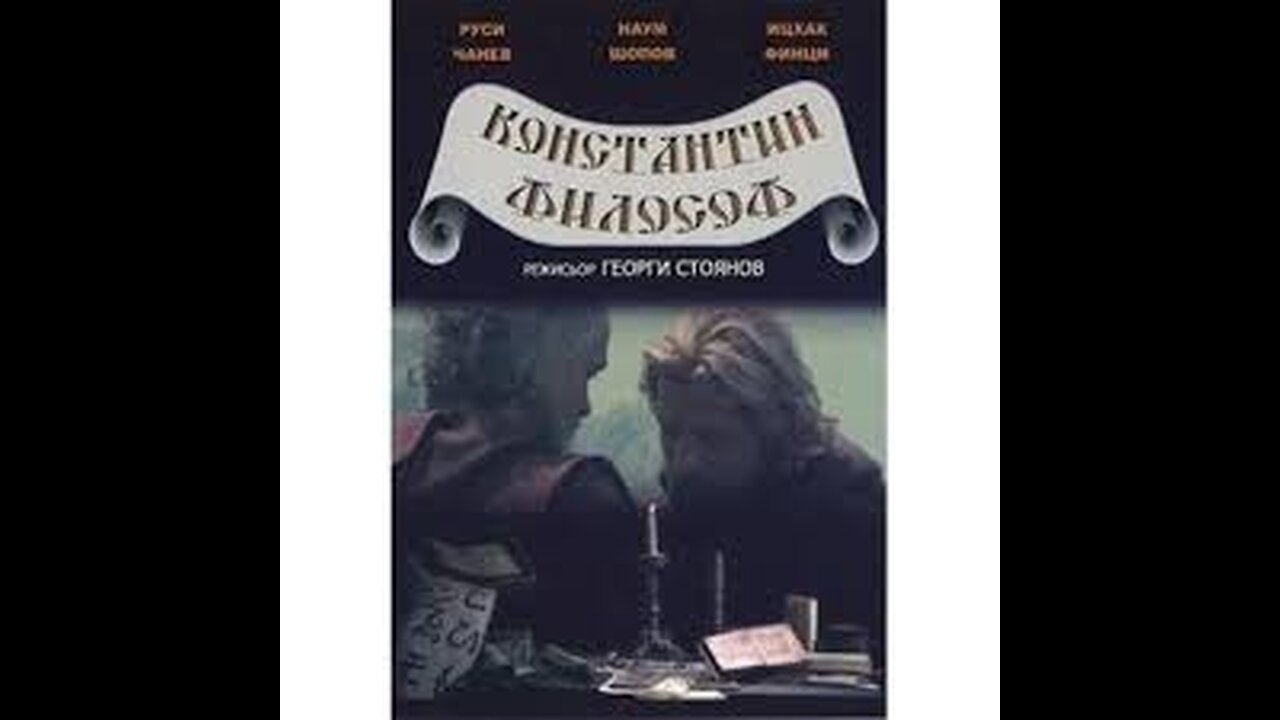Premium Only Content

CONSTANTINE THE PHILOSOPHER (1983) Part 1.
CONSTANTINE THE PHILOSOPHER is a 1983 Bulgarian 2-part film, directed by Georgi Stoyanov, about the first thirty years of the life of the 9th-century Byzantine thinker and diplomat Constantine the Philosopher, better known to Christians by his later monastic name before his death, Cyril.
PLOT:
During the end of the "iconoclastic" period in the Byzantine Empire, young Constantine, thanks to the patronage of his relative, the logothete Theoktistos, comes from the provincial city of Thessaloniki to the capital of the empire - Constantinople-Tsargrad, to the very center of the ruling Byzantine elite. There, the talented young man undergoes training and at the same time notices signs of the beginning of the decay and decline of the empire.
At the head of the empire in these years is the young Emperor Michael III, surrounded by rival court factions, controlled by several regents: the emperor's mother Theodora, the logothete Theoktistos and the emperor's uncle Bardas. In this difficult situation, young Constantine successfully masters the sciences and for his passion for them receives the nickname Philosopher at court. Having noticed the promising young man, the court factions try to draw him into their intrigues, but Constantine the Philosopher is passionate only about sciences and the study of Christian theology. He rejects the path of a profitable marriage and a promising career for the sake of serving God.
Being a convinced Christian since childhood, Constantine "the Philosopher" foresees the future role of the neighboring Slavic barbarians in saving the Byzantine branch of Christianity. From his teachers, Constantine secretly learns that in the emerging split of the united Christian church into Western and Eastern, a special strategic role in their rivalry should be played by the growing northern neighbor of Byzantium - pagan Bulgaria, already prepared for baptism. At the Byzantine court, a captive - a Bulgarian princess - the sister of the future Bulgarian ruler Boris, is brought up in the Christian spirit, and Constantine communicates a lot with her and with other Bulgarian captives, among whom there are many Slavs.
Having mastered the Slavic language since childhood, Constantine thinks about creating a written language for the Christian education of the Slavs. Hundreds of years before the Renaissance, Constantine came to the idea of the future equality of all peoples, regardless of their language and ethnic origin.
However, the rulers of the Byzantine Empire pursue their own far-reaching power goals. Dividing and pitting the Slavic tribes against each other, they try to use the talented Constantine the Philosopher as a tool for the implementation of their internal and external intrigues. But the enlightenment work conceived by Constantine is already becoming unmanageable for politicians. The alphabet created by Constantine, conceived by him as a means of uniting the Slavs, becomes a real force.
856. 29-year-old Constantine the Philosopher decides to devote himself entirely to the work of enlightenment. Together with his students, he leaves Constantinople and joins his older brother, the monk Michael-Methodius. This is where the plot of the film ends, but Constantine's main achievements are still ahead. Together with his brother, Constantine will visit Rome and accept the senior monastic rank and the name Cyril from the Pope. The brothers were still destined, together with their students, to complete the creation of the Slavic Glagolitic alphabet, on the basis of which the Slavic Christian culture would begin its development.
CAST:
Rusi Chanev - Konstantin Philosopher
Marin Yanev - Michael-Mefodiy
Naum Shopov - logothet Feoktist
Nevena Kokanova - Bulgarian princess
Itshak Fintsi - Khalil
Georgi Cherkelov
Velko Kanev
-
 5:27:02
5:27:02
Pepkilla
7 hours agoWe playing what we wanna play today :)
16.7K4 -
 3:08:22
3:08:22
GamerGril
4 hours ago🔥Hell Hath No Fury Like A Woman Scorned🔥
13.5K -
 LIVE
LIVE
Rotella Games
1 day agoMake the Manor Great Again
228 watching -
 3:11:56
3:11:56
The Quartering
4 hours agoEpstein Files Update, SodaGate, Snow White Box Office, Elon & Trump Strike Back BIGLY!
72.7K46 -
 16:38
16:38
Russell Brand
1 day agoThey Can't Hide This Any Longer
168K469 -
 8:54
8:54
Talk Nerdy Sports - The Ultimate Sports Betting Podcast
8 hours ago3/23/25 -March Madness Mayhem: Riste Goes Rogue – 8 Picks & 1 Lock to Burn the Books
55K7 -
 1:52:13
1:52:13
Game On!
21 hours ago $24.80 earnedWhat Happened to March Madness!?
139K11 -
 12:04
12:04
GoldenWebb
1 day ago $2.99 earnedBCM ELW Meltdown
46.9K10 -
 13:16
13:16
Cooking with Gruel
15 hours agoRestaurant Quality Hash Browns
64K33 -
 31:08
31:08
CatfishedOnline
1 day agoMan Wants Divorce After Proposing To WWE Star Liv Morgan?
48.4K18